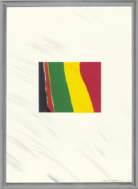The World's Largest Modern & Contemporary Prints & Editions Platform
Picture Of A Pointless Abstraction Framed Under Glass Signed Print

Picture Of A Pointless Abstraction Framed Under Glass
Picture Of A Pointless Abstraction Framed Under Glass
Signed Print
David Hockney
£2,150-£3,200
$4,100-$6,000 Value Indicator
$3,950-$6,000 Value Indicator
¥20,000-¥30,000 Value Indicator
€2,450-€3,650 Value Indicator
$23,000-$35,000 Value Indicator
¥450,000-¥670,000 Value Indicator
$2,900-$4,300 Value Indicator
3 in demand
There aren't enough data points on this work for a comprehensive result. Please speak to a specialist by making an enquiry.
76 x 56cm, Edition of 85, Lithograph
Medium: Lithograph
Edition size: 85
Year: 1965
Size: H 76cm x W 56cm
Signed: Yes
Format: Signed Print
Last Auction: November 2025
Track performance and compare this work against others in your collection.Find out how Buying or Selling works
Auction Results
Auction Date
Auction House
Location
Return to Seller
Hammer Price
Buyer Paid
01 Nov 2025
DuMouchelles
United States
N/A
N/A
N/A
01 Jul 2025
Sotheby's New York
United States
01 Nov 2024
Christie's New York
United States
01 Jun 2024
Mainichi Auction, Tokyo
Japan
01 Jul 2018
Bonhams Knightsbridge
United Kingdom
01 Apr 2017
Sotheby's Online
United Kingdom
01 Dec 2015
Aspire Auctions
United States
MyPortfolio Unlock access to our full history of auction resultsWe are passionate about selling art, not data. We will never share or sell your information without your permission. By entering your data you consent to our use of your data in accordance with our
Unlock access to our full history of auction resultsWe are passionate about selling art, not data. We will never share or sell your information without your permission. By entering your data you consent to our use of your data in accordance with our

400+International auction houses tracked
30+Years of auction data
